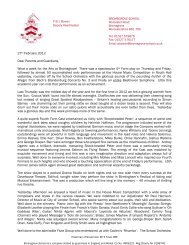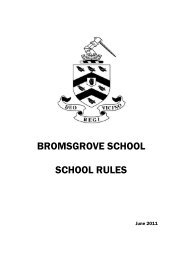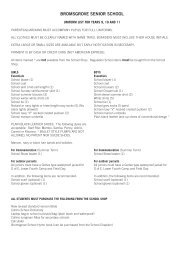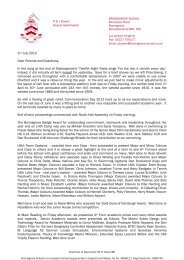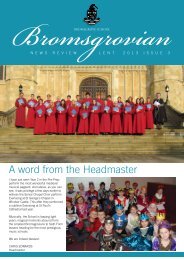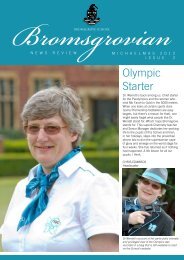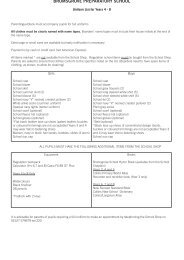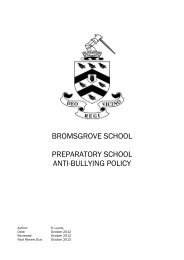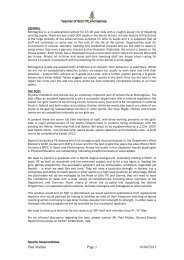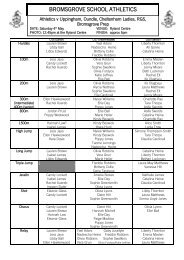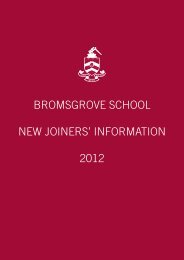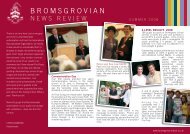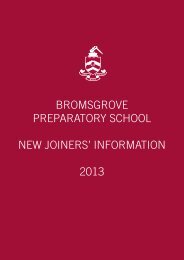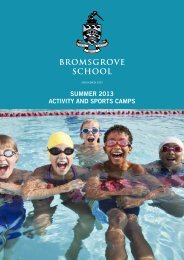Sixth Form Course Booklet 2013 - Bromsgrove School
Sixth Form Course Booklet 2013 - Bromsgrove School
Sixth Form Course Booklet 2013 - Bromsgrove School
Create successful ePaper yourself
Turn your PDF publications into a flip-book with our unique Google optimized e-Paper software.
LATIN<br />
WHY STUDY LATIN?<br />
Like most arts subjects, Latin is not a vocational subject, but rather an academic discipline which uses the language<br />
and subject matter to develop a range of personal skills which are useful for other AS courses and valued by higher<br />
education institutions and employers, who recognise the breadth of the subject. A successful Latin candidate will not<br />
only have a well-developed linguistic ability and understanding through analysis of a logical language and its influence<br />
on modern languages; he or she will also have a developed imagination and wide-ranging experience of many issues<br />
raised by the literature and culture of ancient Rome as well as an ability to formulate a considered response to them.<br />
AIMS OF THE COURSE<br />
<br />
<br />
<br />
<br />
To build on the knowledge, understanding and skills required for GCSE Latin<br />
To develop an understanding of elements of Classical civilisation, literature and language which have had a<br />
profound effect on modern societies<br />
To develop a level of competence in the Latin language and a sensitive and analytical approach to language<br />
generally<br />
To read, understand and make an informed personal response to literature in the original language<br />
SKILLS NEEDED FOR AND DEVELOPED IN THE COURSE<br />
Pupils need to have enthusiasm for and a keen interest in the Latin language and the literature and culture of the<br />
Classical world. They need to possess a sense of inquiry which will enjoy the varying challenges of both detailed<br />
linguistic analysis and wider cultural opinions.<br />
A minimum of a grade B in GCSE Latin.<br />
REQUIREMENTS FOR STARTING THE COURSE<br />
<strong>Course</strong> followed: Latin<br />
Examination Board: OCR<br />
CONTENT OF THE COURSE UNITS<br />
Unit L1: Latin Language<br />
Unit L2: Latin Verse and Prose<br />
Literature<br />
Unit L3: Latin Verse<br />
Unit L4: Latin Prose<br />
Unseen Latin prose to be translated into English. The required grammar<br />
for this paper is specified and there is a defined AS vocabulary list.<br />
Questions are asked on the translation, content, context and literary<br />
style of two prescribed texts. The verse text is an extract from Ovid’s<br />
Amores III. The prose text comes from Cicero’s speech In Verrem II.<br />
Candidates are required to demonstrate their knowledge, understanding<br />
and appreciation of a verse set text (Virgil). Section B tests the<br />
understanding of an unseen passage of Ovid through translation and<br />
comprehension.<br />
Candidates are required to demonstrate their knowledge, understanding<br />
and appreciation of a prose set text (Tacitus or Sallust). Section B tests<br />
the understanding of an unseen passage of Livy through translation and<br />
comprehension.<br />
METHOD OF ASSESSMENT<br />
AS Unit L1 (examination) (50% of AS marks, 25% of A2 marks) 1½ hours<br />
Unit L2 (examination) (50% of AS marks, 25% of A2 marks) 1½ hours<br />
A2 Unit L3 (examination) (25% of A2 marks) 2 hours<br />
Unit L4 (examination) (25% of A2 marks)<br />
2 hours<br />
68



